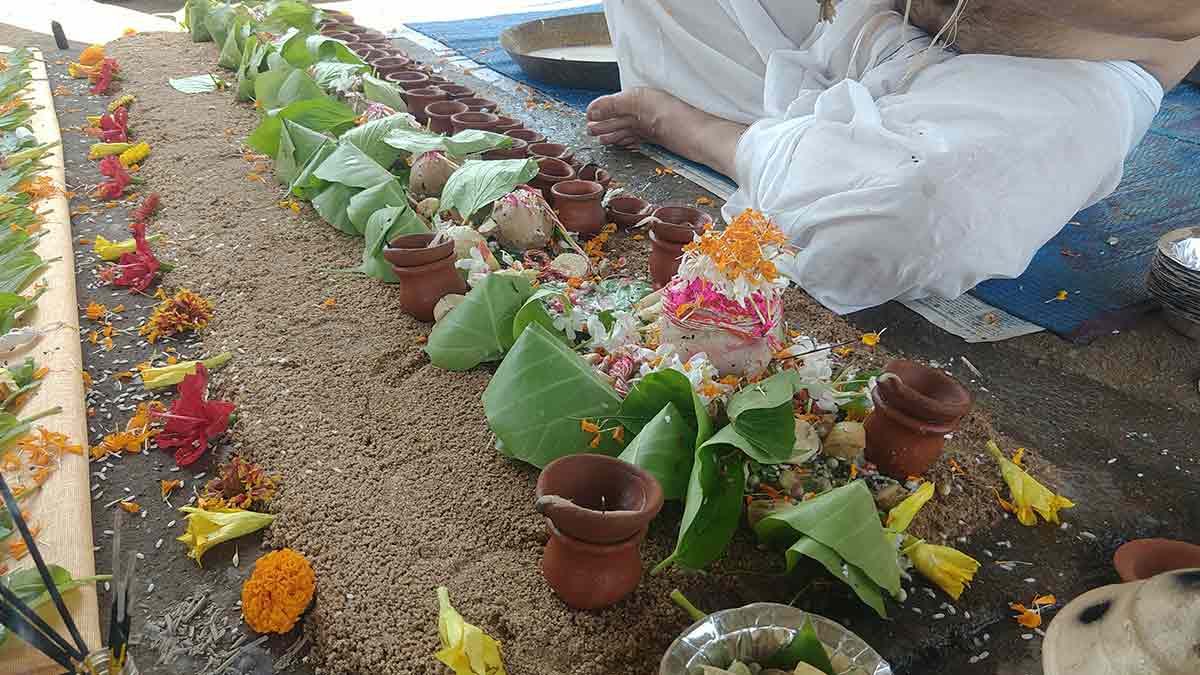Pind Daan in Prayagraj: A Sacred Ritual for Ancestors' Blessings
Explore the sacred ritual of Pind Daan in Prayagraj, a spiritual offering to ancestors for peace, liberation, and blessings.

Prayagraj, a city of great spiritual and cultural significance, is a place that draws millions of devotees every year. Known as the confluence of three holy rivers—Ganga, Yamuna, and the mythical Saraswati—Prayagraj, formerly known as Allahabad, is home to several sacred rituals, one of the most important being Pind Daan. This rite is an essential practice for Hindus, serving as a tribute to deceased ancestors. With a deep connection to the afterlife, Pind Daan is believed to bring peace and liberation to the souls of departed loved ones.
The Significance of Pind Daan
Pind Daan is a ritual performed to ensure that the souls of deceased ancestors achieve peace and salvation (moksha). The word "Pind" refers to the offerings made to the departed souls in the form of rice balls, and "Daan" means the act of giving or offering. Hindus believe that by offering Pind Daan, they help their ancestors' souls navigate their journey to the next world, gaining freedom from any suffering or bondages. The act of performing Pind Daan is seen as a form of both spiritual duty and devotion, a way of expressing gratitude and love for those who have passed away.
In Hinduism, it is believed that the soul lives on even after the body has perished. However, it is believed that these souls can be trapped in a state of unrest or bondage due to past actions or karma. Offering Pind Daan is considered to be a way to free them from this state and guide them toward peace, ultimately ensuring they do not wander in a state of confusion.
Why Prayagraj?
Prayagraj holds immense spiritual importance in Hindu mythology. It is considered one of the seven holiest cities in India, alongside Varanasi, Haridwar, and others. The city is believed to be the site where the sacred rivers—Ganga, Yamuna, and Saraswati—meet. The confluence of these rivers, known as the Triveni Sangam, is considered to be the most auspicious location for performing many of the key Hindu rituals, including Pind Daan. Pilgrims flock to this sacred spot to cleanse their souls and receive divine blessings.
The belief is that Prayagraj is a place where the physical and spiritual realms converge. The Triveni Sangam is said to be a location where the soul is closest to liberation, making it the ideal place to perform rituals that ensure the well-being of the departed souls. Thus, it is no surprise that Pind Daan in Prayagraj holds such importance in the spiritual lives of Hindus.
The Ritual of Pind Daan
The Pind Daan ceremony typically begins with a visit to the banks of the Triveni Sangam, where the person performing the ritual offers prayers and takes a holy dip in the waters. After this, they proceed to the nearby temples and ghats (steps leading to the river) to offer the necessary ritual items. A priest or pandit is usually hired to guide the ceremony.
The primary offering made during Pind Daan is the pind—a ball-shaped form of rice mixed with sesame seeds, ghee, and other auspicious substances. This is offered to the river, symbolizing the feeding of the ancestors' souls. The rice balls are believed to symbolize the body, and the offering represents a gesture of nourishment and support for the spirits of the departed.
The ceremony also involves chanting sacred mantras and prayers to invoke blessings for the ancestors' souls. The priests play an important role in guiding the ritual, ensuring that every aspect of the ceremony is conducted correctly. The participants may also perform tarpan—the offering of water—during this time as a way of ensuring that their ancestors receive the appropriate offerings and blessings.
The Timing of Pind Daan
Pind Daan can be performed at any time during the year, but certain periods are considered more auspicious. The most popular time for performing Pind Daan in Prayagraj is during the Pitru Paksha, a 16-day period in the lunar calendar dedicated to honouring ancestors. This period typically falls in the month of September or October. Pitru Paksha is considered to be a time when the spirits of ancestors are closest to the living, making it the ideal time to perform rituals like Pind Daan.
Additionally, many people perform Pind Daan on the occasion of annual death anniversaries (known as Tithi), which are specific dates based on the lunar calendar. These anniversaries mark the day a person is believed to have passed away, and performing Pind Daan on this day is thought to bring blessings to the departed soul.
Benefits of Pind Daan
Performing Pind Daan is believed to yield several spiritual and karmic benefits. One of the most significant benefits is the peace and liberation of the departed soul. Hindus believe that by performing Pind Daan, the descendants of the deceased ensure that their ancestors' souls are freed from any distress or unresolved karma, allowing them to rest in peace and attain moksha.
For the living participants, the ritual is said to bring blessings of prosperity, peace, and harmony. It is believed that those who perform Pind Daan with sincere devotion will experience the fulfilment of their desires and the removal of obstacles in their lives. It is also a way of showing respect for the past and reinforcing family bonds, creating a sense of continuity between generations.
The Spiritual Aspect of Pind Daan
At its core, Pind Daan is not just about the offerings made during the ritual but also about the deeper spiritual connection between the living and the dead. In Hinduism, the relationship between the physical and spiritual worlds is fluid, with the rituals acting as a bridge between the two. By participating in Pind Daan, individuals reaffirm their ties to their ancestors and the divine, ensuring that their spiritual legacy is preserved for future generations.
Conclusion
Pind Daan in Prayagraj is more than just a ritual; it is a sacred act of remembrance, devotion, and spiritual liberation. By offering prayers and offerings to their ancestors, devotees in Prayagraj seek to bring peace to the souls of their loved ones while simultaneously enriching their own spiritual journey. The city, with its historical and sacred significance, provides the perfect backdrop for this powerful ritual, which continues to be an integral part of Hindu tradition. As long as there is a belief in the interconnectedness of life and death, Pind Daan will remain a meaningful way to honour the past and ensure the blessings of the future.
What's Your Reaction?


















